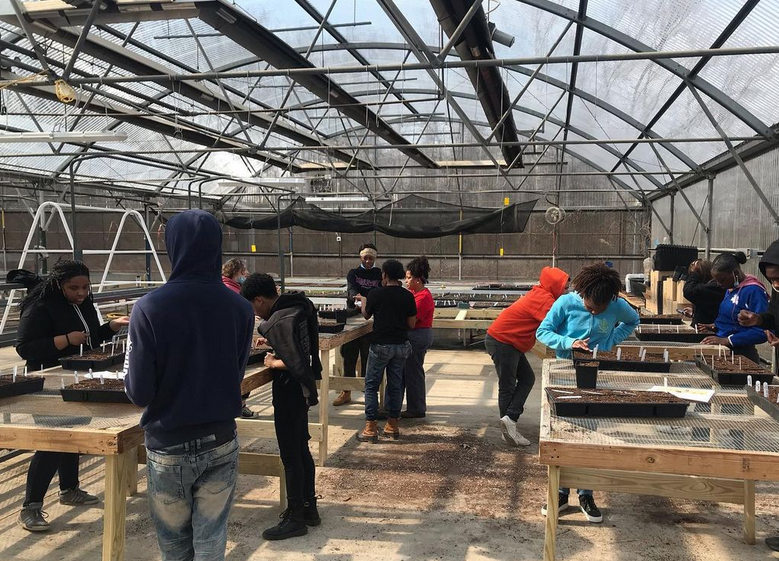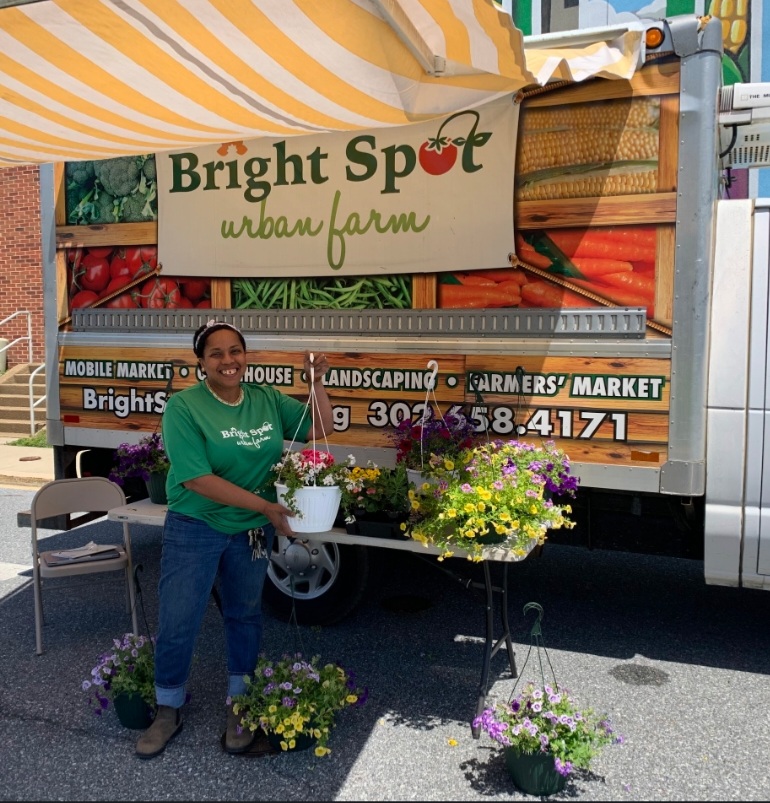I first ran into Bright Spot Farms at a fall event at Bellevue Farms (who will be featured in the next Focus on Food Justice!). I bought some mums from Bright Spot to add some fall color to my yard. From there, I purchased a share in their fall CSA, and then ended up also buying some poinsettias from them in early winter. It was while I was paying for the poinsettias that I made conversation with Airiél Peoples, Bright Spot’s Education Coordinator. We talked about her work running the agriculture and food justice classes for teens. At the time, this food justice series was just an idea, but I immediately knew I wanted to learn more about the work Bright Spot was doing.
R.E. Vanella over on the podcast side had a conversation with Peoples, in the episode “Nobody’s Bullshit Except the Earth.” For this written piece, Peoples introduced me to Program Director Ruth Arias, and I was able to have a conversation with her at Bellevue Farm’s recent spring plant sale event.
Why don’t you start off by saying what Bright Spot Farms is – what do you all do?
Bright Spot Farms is a non-profit organization. We’re a subsidiary of West End Neighborhood House. We’re a youth employment organization as well. We employ low-income youth. We employ about 25 youth a year; most of them live in Wilmington and New Castle. Once they’re with us, they get to learn about [agriculture], so they work in our greenhouse helping us with our plants. They also work on our three-acre farm. They also get to do some community gardening work at Planting Hope which is on the Herman Holloway Campus.
So we’re situated on the Herman Holloway Campus, we lease five acres of land from them, also a greenhouse, and we manage their community garden plot. So the youth help with all that. And they also get to get some life skills, some employment skills, some soft skills.
We teach them a little bit about social justice and food insecurity, why their neighborhoods look the way they do, that type of thing. And they also get some leadership skills. So we hire them in the fall, and again in the spring, and those youth that we do get, they get leadership skills, so they are in training every Saturday. We provide workshops for them as well as workdays, so that in the summer they’re ready to lead their peers.
So in the summer we hire an additional cohort and those that were there all winter are the leaders of that group, and they get to help the new youth work with the plants and understand how our farm works and also how to be a team, how to work as a leader in your community. That type of thing.
So how long have you all been around, and what instigated you getting started? And are you the founder of the organization?
I’m the Program Director. I’ve been there for about a year. The organization started I believe in 2011. It started off as a group of people that were helping youth transitioning out of foster care. And we weren’t on a farm at that point; we were at the Rodney Street Reservoir. So we just had community garden plots and they were selling their produce out of there, and they kept expanding, expanding, and then the state came and agreed to let us lease that land, so we transitioned from foster care to high schoolers. So our work with youth are 14-to-18-year-olds that are in high school.
How do you get connected with kids in the area? What does your outreach look like?
So we have some partnerships with William Penn High School and a few other high schools in the area, as well as – it’s mostly word of mouth. So a lot of the youth that attend our leadership sessions in the spring and the fall, they reach out to their peers so they can apply in the summer. It’s usually like, “Hey, I’m in this great program, you should come out and apply.” That’s how we’ve been able to grow the program – just by the testimony of the youth that have been there as leaders.
How many kids are active this summer?
Starting in February we grew the group to 15. It’s usually about 8-to-10, and in the summer there’ll be an additional 15. So it’s usually 10 in the spring, 15 in the summer, and then 10 again in the fall. So we try to have about 25 yearly.

And is that your max capacity?
We’re a very small organization, there’s only four of us. [laughs] We have one farmer, we have a greenhouse manager, and we have the educator, and myself.
I’ve also spoken with Airiél – is she the greenhouse manager?
She’s our education coordinator. So it’s mostly her with the youth in the spring and the winter. So it’s hard to grow with just one person. [laughs]
Yeah [laughs] So is your funding mostly through the state then, at this point?
We usually apply for grants. A lot of our funders make some donations, and to pay our youth a decent salary, we do apply for funding from the state in order to pay them. That’s why we have to keep it a little small, because we try to pay them above the minimum wage.
Great. And then what other programs do you have? You mentioned the classes, the ag education, and I know in terms of the larger community you also do a CSA in the winter and the summer, right?
Yeah, it starts in May and ends in November.
And is that another funding source for you as well?
Sort of. So our CSA part of our organization is part of the – like I said, we lease that land, three acres, from the state. All that produce is used for CSAs and some farm markets. Our whole goal with CSAs is to feed the insecure. So 70% of our CSAs are for food insecure families. We have a few contracts, some with the state of Delaware, so they purchase 30 CSAs and they distribute them throughout the community. We have [another] grant through Highmark, and we’re able to provide another 35 CSAs for food insecure families that are distributed throughout the season. And then we also have people who send us donations so that food insecure families can have a CSA at a sliding scale amount. So our CSAs run from – the full share is $750 and a half is $400. But if you are a SNAP recipient, you can purchase a full share for just a hundred dollars.
Wow.
And that supplements it through our generous donors who are like, “And here’s another $400 for someone else who can’t afford it.”
Yeah. So I sort of heard of you, met you, by you coming to the farmers’ markets at Bellevue Community Center. What other events around, or farmers’ markets, do you go to?
Because of covid, we stopped doing farmers’ markets. Then last fall we did a little soft returning to farmers’ markets. So we started at Bellevue, and we did a little farmers’ market at Kennett Square also. We also participated in the Union Street Farmers’ Market. This year, we’ll be at Bellevue, we’ll be at Kennett Square again, and we’ll also be at the Cool Springs Market.
Great! Your flowers are always beautiful.
Thank you [laughs]
So that’s an easy one. [laughs] In terms of people supporting your organization, or even just running into you more – CSAs, visiting you at the farmers’ markets – are there other community engagement things that you do?
Our youth, during the fall season, they go out into the community, into community centers, and they do workshops for other youth. So they’ll be out in the community doing healthy eating classes as well as some food justice classes and social justice classes.
So they’re learning, and then teaching.
Right. Our whole concept is, whatever you learn you’re supposed to spread. Go out into the community and spread whatever you learn here at Bright Spot Farms. That’s the goal. Keep spreading. [laughs]
Yeah. Do you have any goals or, what’s your vision of what you want Bright Spot to do in the next few years?
I would love it if we had the access not just to more land to continue feeding the insecure, but having a wider reach. We go by whatever grants that we do get, but if we could reach out to more communities in Wilmington and let them know what CSA is and the value of it – a lot of times we do distribute a lot of our produce, a lot of our produce if it was sold at Whole Foods or another super market would be worth $50, and we just want them to know the value of what they’re getting.
Yeah absolutely. How can people keep up with what you’re doing? I know you’re on Instagram, because I follow you [laughs].
Yeah [laughs]. We’re on Instagram and Facebook.
Awesome. Well thank you so much for talking with me today!
And thank you!
More with Bright Spot Farms
Apply for their youth program
Purchase or donate a CSA share
Shop their plant selection

